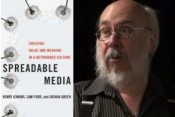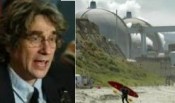DISRUPTIVE: BIO-INSPIRED ROBOTICS features three separate interviews with (1) RADHIKA NAGPAL, (2) ROBERT WOOD, and (3) CONOR WALSH
Written on October 15th, 2015Welcome to the second episode of my new monthly podcast series produced with Harvard’s Wyss Institute for Biologically Inspired Engineering.
DISRUPTIVE: BIO-INSPIRED ROBOTICS features three separate interviews with (1) RADHIKA NAGPAL, (2) ROBERT WOOD, and (3) CONOR WALSH. From insects in your backyard, to creatures in the sea, to what you see in the mirror, engineers and scientists at Wyss are drawing inspiration to design a whole new class of smart robotic devices
In this one, CONOR WALSH discusses how a wearable robotic exosuit or soft robotic glove can assist people with mobility impairments, as well as how the goal to create real-world applications drives his research approach.
In part one, RADHIKA NAGPAL talks about her work Inspired by social insects and multicellular systems, including the TERMES robots for collective construction of 3D structures, and the KILOBOT thousand-robot swarm. She also speaks candidly about the challenges faced by women in the engineering and computer science fields.
In part two, ROBERT WOOD discusses new manufacturing techniques that are enabling popup and soft robots. His team’s ROBO-BEE is the first insect-sized winged robot to demonstrate controlled flight.
The mission of the Wyss Institute is to: Transform healthcare, industry, and the environment by emulating the way nature builds, with a focus on technology development and its translation into products and therapies that will have an impact on the world in which we live. Their work is disruptive not only in terms of science but also in how they stretch the usual boundaries of academia.
http://wyss.harvard.edu/
– See more at:
DISRUPTIVE: BIO-INSPIRED ROBOTICS Radhika Nagpal Interview
DISRUPTIVE: BIO-INSPIRED ROBOTICS Robert Wood Interview
Conor Walsh’s interview transcript
http://aworldthatjustmightwork.com/2015/07/auto-draft-18/
Q&A w/ HENRY JENKINS, SPREADABLE MEDIA – Creating Value and Meaning in a Networked Culture
Written on September 12th, 2014 |
Aired: 04/21/13
“If it doesn’t spread, it’s dead,” is the simple consistent message of a new book, SPREADABLE MEDIA: Creating Value and Meaning in a Networked Culture, that maps the changes taking place in our media environment. For all their consolidation, concentration, and money, corporations can no longer control media distribution. Millions are now directly involved in the creation and circulation of content.
“Stickiness” – focusing attention in centralized places — has been the measure of success in the broadcast era. No more. “Spreadability” – dispersing content through formal and informal networks, with and without permission – is the new goal.
What does this mean for media? For information? For culture? For the distribution of power? And how can you take advantage of the new realities to have greater impact and influence?
I’ll be talking about all of that this week with one of the book’s authors, HENRY JENKINS. He coined the term “participatory culture” and he’s been paying attention for decades to the crowd on the other side of the camera, the microphone, and the screen.
www.henryjenkins.org
www.spreadablemedia.org
Q&A: HARVEY WASSERMAN – Restart San Onofre or Shut It Down?
Written on January 11th, 2013 |
|
Aired 01/06/13
I’ll be talking with longtime anti-nuke activist Harvey Wasserman about where things stand today in terms of nuclear power. What’s going on in the US — are new plants being built, are old ones shutting down? We’ll get an update on Fukushima. And finally, we’ll address the temporary shutdown at San Onofre near San Diego, and the opportunity to shut it down permanently.
Wasserman is a teacher, author, and activist, focusing primarily on election protection and nuclear power. With Bob Fitrakis, he helped break many of the major stories surrounding the 2004 presidential election in Ohio. In 1973 Harvey helped pioneer the global grassroots movement against atomic reactors, helping to organize mass demonstrations at Seabrook, N.H., as well as 1979’s “No Nukes” concerts and rallies, featuring Bruce Springsteen, Bonnie Raitt, Jackson Browne, CSN, James Taylor. He edits the NukeFree.org web site, and is senior editor of www.freepress.org. and author or co-author of a dozen books including What Happened in Ohio?, co-authored with Bob Fitrakis and Steve Rosenfeld, Harvey Wasserman’s History of the U.S.and SOLARTOPIA! Our Green-Powered Earth, A.D. 2030.
www.harveywasserman.com

